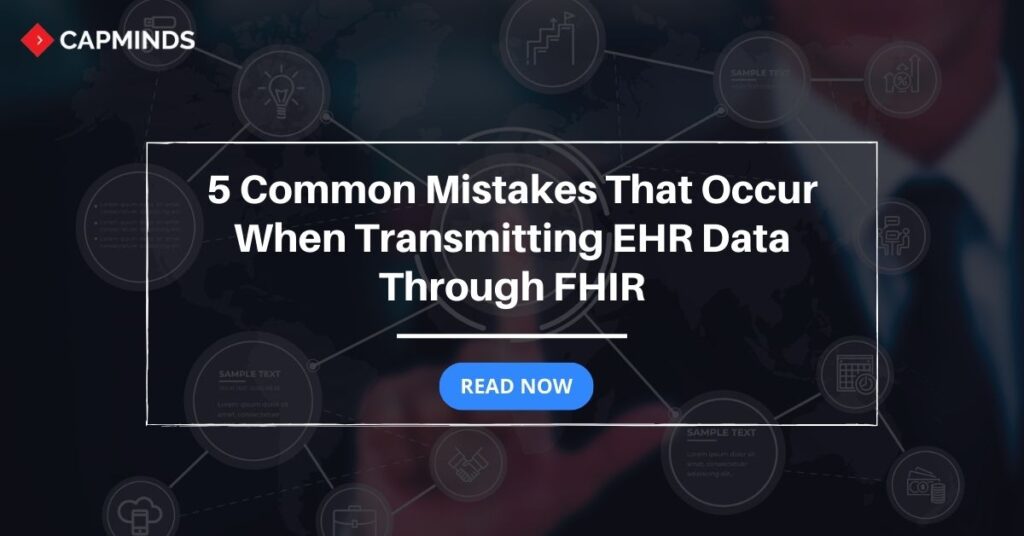5 Common Mistakes That Occur When Transmitting EHR Data Through FHIR
Fast Healthcare Interoperability Resources (FHIR) is a crucial bridge between healthcare systems that help transmit Electronic Health Record (EHR) data.
According to a survey conducted across healthcare practices, over 30% reported instances of incomplete data transmission, resulting in compromised patient care and an increase in medical errors.
Healthcare practices must navigate potential pitfalls to ensure the integrity and accuracy of data transmission through FHIR.
This blog post will walk you through the five common mistakes and impacts that occur when transmitting data through FHIR.
Understanding FHIR
Before getting into the topic, you need to understand FHIR.
Electronic Health Records (EHR) have made a significant impact on healthcare practices.
Although EHRs help maintain, digitize, and organize patient information, this data must flow seamlessly between healthcare entities such as pharmacies, labs, clinics, and hospitals.
This is where FHIR comes into play. FHIR (Fast Healthcare Interoperability Resources) is a standard for exchanging healthcare information electronically.
It facilitates the seamless exchange of information between different healthcare systems to improve interoperability.
Healthcare providers and practices can easily access patients’ comprehensive information.
RELATED: HL7 FHIR Implementation: Better Standardizing Maternal & Infant Health Data Exchange
Five Common Mistakes When Transmitting EHR Data through FHIR
These are the five common mistakes that occur when transmitting EHR data through FHIR, impacting healthcare practices.
Incomplete Data Transmission
- Incomplete data transferring and partial EHR data might occur when transmitting EHR data through FHIR.
- Incompatibility issues between different EHR systems lead to the loss of crucial patient data when transferring.
- Incomplete transmission of data can pose a risk to patient safety and may lead to medical errors.
Security Breaches
- Inadequate encryption and security protocols make EHR data susceptible to hacking.
- Weak authorization can lead to unauthorized users gaining sensitive patient information.
- Security breaches can result in violations of regulations protecting healthcare data and lead to legal repercussions.
Data Mapping Errors
- The lack of standardized data formats makes it difficult to seamlessly translate between EHR systems.
- Mismatched data elements can lead to the misinterpretation of patient data.
- FHIR resources may not align with EHR system requirements, causing data mapping discrepancies.
Network Connectivity Issues
- Unstable internet connection and network issues can delay the real-time transmission of EHR data.
- Connectivity issues can lead to delays in accessing patient information, affecting decision-making and patient care delivery.
Insufficient Training and Education
- Healthcare professionals may not have sufficient training to leverage the full potential of FHIR.
- Insufficient training during the onboarding process can slow the adoption and effective use of FHIR.
- FHIR requires ongoing education to keep the healthcare staff up-to-date on best practices.
RELATED: HL7 FHIR & EHR Data Transmission: 9 Easy Steps to Implement
The Impact in Healthcare Practice:
These are the five common mistakes that can occur when transmitting EHR data through FHIR in healthcare practices. However, these common mistakes might result in significant impacts:
- According to a recent survey, many healthcare practices reported issues related to incomplete data transmission through FHIR, leading to the loss of crucial patient information.
- A survey reveals that few healthcare practices have faced security breaches during the time of transmitting EHR data through FHIR.
- U.S. healthcare practices have reported, “Due to the insufficient training, our healthcare staffs have limited in utilizing the full potential of FHIR”
- Due to network connectivity issues, many healthcare practices are disrupted in between while transferring EHR data.
CapMinds FHIR Interoperability Service For Seamless Data Transmission
CapMinds FHIR Interoperability service ensures increased efficiency in EHR data transmission, accuracy, and ecosystem within your healthcare practice.
Problems You Face When Exchanging Data Through FHIR
- Transmitting Incomplete EHR Data
- Security and Privacy Breaches
- Inaccurate Data Mapping
- Lack of Standardization
- Insufficient training and education about FHIR Interoperability
- High Cost of EHR Data Transmission Solution
CapMinds Comprehensive Solution
- Our solution ensures comprehensive data transmission, minimizing incomplete EHR data.
- We prioritize safety, security, encryption, and authentication to protect healthcare practice’s patient data.
- CapMinds uses exact data mapping for accurate translation to prevent errors.
- Our solution ensures seamless interoperability adhering to industry standards, and uses standard protocols to transmit EHR data.
- We offer comprehensive training sessions to healthcare staff for efficient management of EHR data transfer.
- Our affordable solutions provide benefits to healthcare organizations at all levels.
Our FHIR Interoperability Service is designed to overcome the common mistakes in EHR Data Transfer.
Contact CapMinds Today and Get a Free Demo of Our exceptional service.



